Please Note: These documents are in ![]() PDF format and will launch in a second browser window or tab. Adobe
Acrobat Reader is required.
PDF format and will launch in a second browser window or tab. Adobe
Acrobat Reader is required.
 Controlling Corruption rests on the 1998 Laurentian Seminar participant’s assertion that the institution of parliament and parliamentarians are crucial in serving as a bridge between state and society and in implementing and/or strengthening the good governance values of accountability, transparency and participation (see Figure 1: The Ecology of Governance). It also claims that parliaments play a key and a leadership role in encouraginggood governance and, furthermore, that parliaments and parliamentarians need to work regionally and internationally in order to effect change.
Controlling Corruption rests on the 1998 Laurentian Seminar participant’s assertion that the institution of parliament and parliamentarians are crucial in serving as a bridge between state and society and in implementing and/or strengthening the good governance values of accountability, transparency and participation (see Figure 1: The Ecology of Governance). It also claims that parliaments play a key and a leadership role in encouraginggood governance and, furthermore, that parliaments and parliamentarians need to work regionally and internationally in order to effect change.
![]() Controlling Corruption: A Parliamentarian's Handbook (Arabic Edition)
Controlling Corruption: A Parliamentarian's Handbook (Arabic Edition)
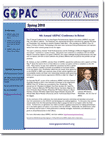 In This Issue:
In This Issue:
Articles on the 4th Annual ARPAC Conference in Beirut
A meeting of parliamentarians held at the World Bank
A GOPAC workshop that was held in Accra in March
March 2010 Vol 7 No. 1 (GOPAC AML/GTF Newsletter)
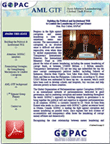 In This Issue:
In This Issue:
Building the Political and Institutional Will
Attention GOPAC members
Formulating Strategies for Strengthening Mechanisms to Combat Corruption
AML GTF background
17th Egmont Group Plenary
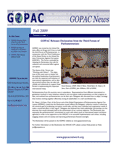 In This Issue:
In This Issue:
GOPAC Releases Declaration from the Third Forum of Parliamentarians
GOPAC launches it's Handbook on Parliamentary Ethics and Conduct
GOPAC CEO attends APNAC Annual General Meeting
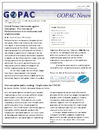 In This Issue:
In This Issue:
Role of Parliamentarians
Anti Corruption Policy Making
UNODC’s Assistance
Supporting the UNCAC
OECD Convention
Momentum for Change
Attending to Instances
 Read this issue for current information on the Global Task Forces.
Read this issue for current information on the Global Task Forces.
In This Issue:
Parliamentary Ethics Global Task Force: The Approach
Parliamentary Oversight: A Latin America Approach
UNCAC: The Importance of Parliamentarians and Political Will
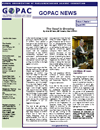 The
Seed is Growing.
The
Seed is Growing.
Corruption and Corporate Responsibility; The new
Tenth Principle of the
Global Conduct.
South East Asia Takes First Steps.
Singapore Tackles Corruption Head- On.
Parliamentarians and Leadership in Combating Money
Laundering.
 GOPAC
Regional Chapter and Organization of American States
(OAS) Sign Cooperation Agreement
GOPAC
Regional Chapter and Organization of American States
(OAS) Sign Cooperation Agreement
News from the GOPAC Secretariat
Trinidad and Tobago’s Anti-Corruption Strategy
Fighting Corruption in Norway
Combatting Corruption: The Approach of theCouncil
of Europe
Measures to Prevent Corruption in the Thai Parliament
Regional Chapter Updates and
Regional Contacts
 GOPAC
Member Founds Centre for Good Governance
GOPAC
Member Founds Centre for Good Governance
The Safeguards are in the Details: Proposed Senate
Bill S2248
News From the GOPAC Secretariat
Creation of the International Movement of Parliamentarians
for Democracy...
Financing Democracy: Political Parties, Campaigns,
and Elections
UK Draft Corruption Bill
GOPAC Regional Updates
GOPAC Regional Contacts
 Chairman’s Message
Chairman’s Message
Problems Faced by Anti-Corruption initiatives in Post Soviet Union Countries: Ukraine
APNAC-Kenya Member in Plane Crash
Tanzania to Create National Chair
Global Conference of Parliamentarians Against Corruption Report
News from the GOPAC Secretariat
Congratulations to APNAC-Kenya
The Pioneer Work of GOPAC: A Russian Perspective
GOPAC Regional Updates
Regional Contacts
GOPAC Contacts
 GOPAC Welcomes the World
GOPAC Welcomes the World
The Parliamentary Centre and GOPAC
The Problem of Corruption in a process of Democratisation of Postcommunist Countries
Fighting a Goliath...
German Parliament Approached
When the Bulls Fight, the Grass Suffers
Regional Contacts
• The
Role of Parliaments in Holding Government to Account
and Controlling Corruption by John G. Williams ( ![]() PDF )
PDF )
• Introduction to APNAC by Augustine Ruzindana
(MP, Uganda) ( ![]() PDF
)
PDF
)
• Parliamentary Ethics and Accountability:
A Code of Conduct for Parliamentarians by Ross Robertson
(MP, New Zealand) ( ![]() PDF
)
PDF
)
• Beware the Gap! – Parliamentary Oversight
or Parliament Overlooked? A Paper For The Association
of Public Accounts Committees Conference, Nelspruit,
South Africa by Peter Loney MP, Deputy Speaker, Parliament
of Victoria ( ![]() PDF
)
PDF
)
• Parliamentarians Fighting Corruption : A
Conceptual Overview by Tilla McAnthony, Rick Stapenhurst
and Martin Ulrich. ( ![]() PDF
)
PDF
)
USING NETWORKS FOR CAPACITY ENHANCEMENT - Lessons from Anticorruption Parliamentary Networks. Meaghan Campbell, GOPAC Program Manager and Frederick C. Stapenhurst, of the World Bank Institute
 National,
regional, or global networks of parliamentarians are
proving important vehicles for enhancing their capacity
and the effectiveness of parliaments in developing
countries in Asia, Africa, and Latin America and the
Caribbean, particularly in fighting corruption and
mitigating its negative impacts on economic and human development.
This Capacity Enhancement (CE) Brief reviews the activities of several
such networks worldwide at the individual, regional,
and global levels that are making a difference in
the ability of parliamentarians to address corruption
in their countries.
National,
regional, or global networks of parliamentarians are
proving important vehicles for enhancing their capacity
and the effectiveness of parliaments in developing
countries in Asia, Africa, and Latin America and the
Caribbean, particularly in fighting corruption and
mitigating its negative impacts on economic and human development.
This Capacity Enhancement (CE) Brief reviews the activities of several
such networks worldwide at the individual, regional,
and global levels that are making a difference in
the ability of parliamentarians to address corruption
in their countries.
• Brochure
Sep 12, 2010